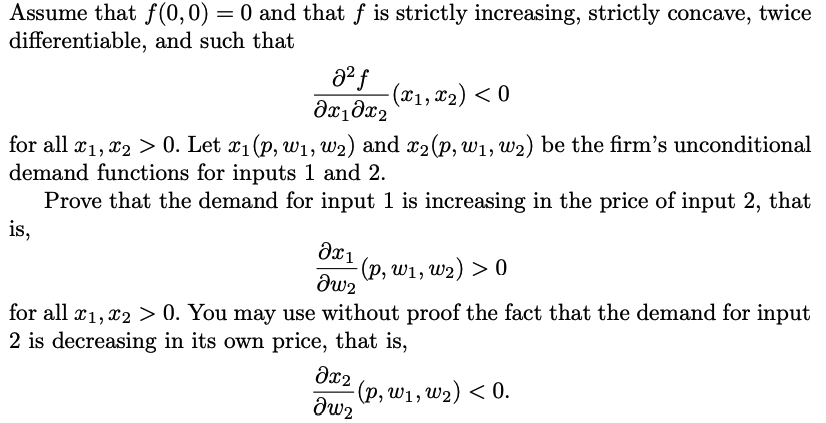Home /
Expert Answers /
Economics /
a-price-taking-firm-producing-a-single-product-according-to-the-production-function-y-f-left-x-pa964
(Solved): A price-taking firm producing a single product according to the production function \( y=f\left(x ...
A price-taking firm producing a single product according to the production function \( y=f\left(x_{1}, x_{2}\right) \) faces price \( p \) for its output and prices \( w_{1}, w_{2} \) for its inputs.
Assume that \( f(0,0)=0 \) and that \( f \) is strictly increasing, strictly concave, twice differentiable, and such that \[ \frac{\partial^{2} f}{\partial x_{1} \partial x_{2}}\left(x_{1}, x_{2}\right)<0 \] for all \( x_{1}, x_{2}>0 \). Let \( x_{1}\left(p, w_{1}, w_{2}\right) \) and \( x_{2}\left(p, w_{1}, w_{2}\right) \) be the firm's unconditional demand functions for inputs 1 and \( 2 . \) Prove that the demand for input 1 is increasing in the price of input 2 , that is, \[ \frac{\partial x_{1}}{\partial w_{2}}\left(p, w_{1}, w_{2}\right)>0 \] for all \( x_{1}, x_{2}>0 \). You may use without proof the fact that the demand for input 2 is decreasing in its own price, that is, \[ \frac{\partial x_{2}}{\partial w_{2}}\left(p, w_{1}, w_{2}\right)<0 \]

